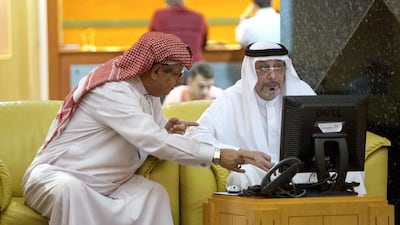Small volumes, high prevalence of insider information and restrictions on foreign ownership are the biggest impediments to hedge funds making meaningful investments into regional equities, industry analysts said yesterday.
“Let’s take the bull by the horns,” said Sohail Jaffer, the deputy chief executive for FWU Dubai Services and the regional representative of the Alternative Investment Management Association (Aima). “The problem is unless we have a capital market being created in the GCC where we have one exchange that gives rise to volumes and the use of derivatives, only then are we going to see some more trading in the local capital markets.”
The Abu Dhabi Securities Exchange General Index has gained 12.5 per cent so far this year, while the Dubai Financial Market General Index is up 38.7 per cent over the same period. Qatar’s benchmark has advanced 35.3 per cent since January. Saudi Arabia’s Tadawul has gained 22.2 per cent.
With the upgrade of the UAE and Qatar to emerging markets status and the imminent opening of Saudi Arabia’s exchange to foreign investors, hedge funds are again eyeing the region’s stock markets in search of sizeable profits, according to participants at the Aima Middle East Hedge Fund Investor Summit in Dubai yesterday.
“We represent many hedge funds in the US and Europe, and we see a lot of activity here because we advise them on disclosure limits, when they go over certain limits on their holdings in local stocks,” said Muneer Khan, a partner at the law firm Simmons & Simmons.
“In particular, in the past 12 to 18 months there have been lots of requests for advice for various disclosure requirements; short-selling regulations within the UAE and also within the rest of the region; restrictions and limitations on what investors can and cannot do. We are definitely seeing more activity here.”
While about US$200 billion from the Middle East is estimated to be invested into hedge funds, the region is typically a source market for capital rather than a place to deploy it.
This may be about to shift after a number of publicly listed firms in the UAE and Qatar, and their respective exchanges, were incorporated into MSCI’s Emerging Markets Index in June and Saudi Arabia’s cabinet in July approved the opening up of its bourse to foreign investors by the first half of next year. The kingdom’s regulator subsequently introduced draft rules to govern trading by non-Saudis, including a 10 per cent cap on foreign ownership.
As a result, MSCI, whose indexes are tracked by investors managing about US$9 trillion worth of assets, may fast-track Saudi Arabia to emerging-market status if it eases its foreign ownership restrictions, industry analysts have said.
Despite the opportunities, hedge funds are also deterred by concerns about the levels of insider trading on regional stock markets.
About 80 per cent of the trading on the UAE exchanges is dominated by retail investors, who rely on speculative trading to exploit volatility in stock prices.
“With issues such as asymmetric information distribution, where one party in a transaction has more information to another, there has to be an identifiable way and mechanism to participate in the local market,” said Zachary Cefaratti, a risk officer at Dalma Capital Management. “Hedge funds rely on what is publicly known about securities. But the market is dominated by players that have information advantages. It’s difficult to see much activity-seeking alpha when a lot of alpha is being exploited and drawn away from markets when info is not evenly distributed.”
halsayegh@thenational.ae
Follow The National's Business section on Twitter

